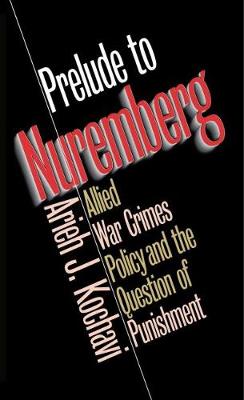Between November 1945 and October 1946, the International Military Tribunal in Nuremberg tried some of the most notorious political and military figures of Nazi Germany. Most histories of the prosecution of war criminals from World War II focus on these trials and the punishment meted out to the leaders of the Axis powers. But as Arieh Kochavi notes, the issue of punishing war criminals was widely discussed by the leaders of the Allied nations well before the end of the war. In this book, Kochavi demonstrates that the policies finally adopted, including the institution of the Nuremberg trials, represented the culmination of a complicated process rooted in the domestic and international politics of the war years. Drawing on extensive research in both US and British archives, Kochavi reconstructs the deliberations that went on in Washington and London at a time when the Germans were perpetrating their worst crimes. He also examines the roles of the Polish and Czech governments-in-exile, the Soviets and the United Nations War Crimes Commission in the formulation of a joint policy on war crimes, as well as the neutral governments' stand on the question of asylum for war criminals.
This account seeks to shed light on an important and perhaps least understood aspects of World War II.
- ISBN13 9780807824337
- Publish Date 16 November 1998
- Publish Status Out of Print
- Out of Print 11 June 2013
- Publish Country US
- Imprint The University of North Carolina Press
- Edition New edition
- Format Hardcover
- Pages 328
- Language English
